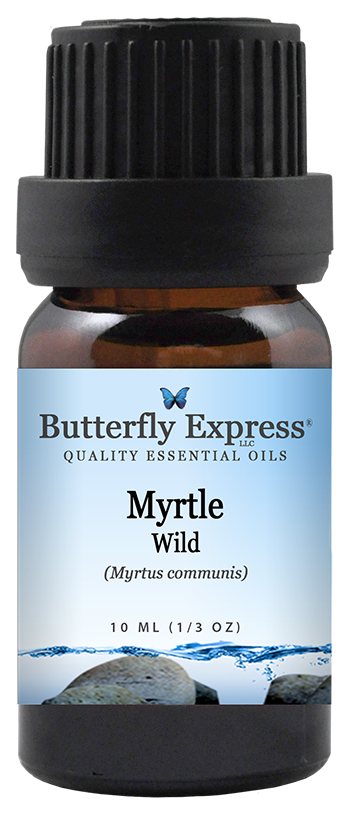Myrtle Wild
(Myrtus communis)
THERAPEUTIC PROPERTIES: antiseptic, antibacterial, decongestant, deodorizer, immune stimulant, digestive, antitussive, balsamic, carminative, pectoral
AFFINITY FOR: digestion, skin, thyroid, lung, prostate, bladder and kidneys, thyroid, heart chakra, heart meridian
RESONANCE: physical, emotional, spiritual
PLANT FAMILY: Myrtaceae
PART UTILIZED: leaves
EXTRACTION METHOD: steam distilled
AROMATIC CONSIDERATIONS: The aroma of Myrtle essential oil is musky and almost euphoric. It is said to soothe anger and make the spirit quieter.
APPLICATION: Myrtle should be diluted and applied to any area of the body or to the feet.
EMOTIONAL - SPIRITUAL - MENTAL ASPECTS: Myrtle oil is strong and grounding. It seems to open all of the senses. Myrtle can help us develop the organizational skills needed for success and stress-free living. Myrtle is about learning to prioritize in our lives, taking care of the necessities first. This helps us establish a sound base for further spiritual growth. Myrtle, since it removes some of the stresses in our lives through grounding and organization, is often useful for insomnia.
PHYSICAL ASPECTS: Myrtle is a very anti-inflammatory and decongestant oil. These properties make it useful for diarrhea, bladder infections, sinus infections, and lung complaints such as asthma, bronchitis, chronic coughs, and tuberculosis. Myrtle regulates the functions of glands in the endocrine system. This effect is seen most clearly in the stimulation of thyroid activity and in the decongestion of the prostate. Myrtle has a stabilizing effect on hormones and supports immune function. Myrtle is a powerful deodorizer. It is a good skin care oil and aids the digestive system.
GENERAL INFORMATION: The recorded use of Myrtle essential oil goes back 4,000 years.
CAUTIONS: Myrtle has some hormonal properties. It should be used with caution if pregnant.
©Copyright Butterfly Expressions 2020, 2021

